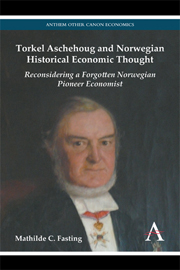 Torkel Aschehoug and Norwegian Historical Economic Thought
Torkel Aschehoug and Norwegian Historical Economic Thought Book contents
- Frontmatter
- Contents
- Acknowledgements
- Chapter 1 Introduction
- Chapter 2 Biography
- Chapter 3 Norwegian Economic and Political Context in the Nineteenth Century
- Chapter 4 Norwegian Economic Thought and Method
- Chapter 5 Development of the Economic Thought of Aschehoug: Statsøkonomisk Forening and the Socialøkonomik Project
- Chapter 6 The German Historical School: Similarities, Influences and Discrepancies
- Chapter 7 Alfred Marshall: Aschehoug and the Adoption of Marginal Theory
- Chapter 8 The French Influence: Adopting Say and Refuting Socialism
- Chapter 9 Views of Labour in the Work of Aschehoug
- Chapter 10 The Entrepreneur: The Fourth Production Factor
- Chapter 11 Trade and Customs Debates from 1840 to 1906
- Chapter 12 The Theory of Economic Crises
- Chapter 13 The Legacy of Aschehoug: Concluding Remarks
- Appendix A Other Norwegian Turn-of-the-Century Economists
- Appendix B Drafts for Socialøkonomik
- Appendix C Detailed Contents of Socialøkonomik (First Editions from 1903 to 1908)
- Notes
- Literature
- Index
Chapter 5 - Development of the Economic Thought of Aschehoug: Statsøkonomisk Forening and the Socialøkonomik Project
Published online by Cambridge University Press: 05 March 2014
- Frontmatter
- Contents
- Acknowledgements
- Chapter 1 Introduction
- Chapter 2 Biography
- Chapter 3 Norwegian Economic and Political Context in the Nineteenth Century
- Chapter 4 Norwegian Economic Thought and Method
- Chapter 5 Development of the Economic Thought of Aschehoug: Statsøkonomisk Forening and the Socialøkonomik Project
- Chapter 6 The German Historical School: Similarities, Influences and Discrepancies
- Chapter 7 Alfred Marshall: Aschehoug and the Adoption of Marginal Theory
- Chapter 8 The French Influence: Adopting Say and Refuting Socialism
- Chapter 9 Views of Labour in the Work of Aschehoug
- Chapter 10 The Entrepreneur: The Fourth Production Factor
- Chapter 11 Trade and Customs Debates from 1840 to 1906
- Chapter 12 The Theory of Economic Crises
- Chapter 13 The Legacy of Aschehoug: Concluding Remarks
- Appendix A Other Norwegian Turn-of-the-Century Economists
- Appendix B Drafts for Socialøkonomik
- Appendix C Detailed Contents of Socialøkonomik (First Editions from 1903 to 1908)
- Notes
- Literature
- Index
Summary
Development of Aschehoug's Economic Thought
Although Aschehoug started his academic career in the 1840s, it was not until the 1870s that he concentrated on the formation and development of economic thought in Norway. The picture that is presented in the analysis of Anne-Lise Seip concentrates on his early years up until 1882. The full title of her book and doctoral thesis is Vitenskap og virkelighet: Sosiale, økonomiske og politiske teorier hos T. H. Aschehoug 1845 til 1882 (Science and reality: Social, economic and political theories of T. H. Aschehoug 1845 to 1882). Admittedly, she does not analyse the development in his thought until the publication of Socialøkonomik, and one of the opponents of her doctoral thesis, Francis Sejersted, says that this development is lacking in her analysis. He believes that she does not fully appreciate how Aschehoug's superior knowledge of economics and general experience allowed him to develop a more nuanced and detailed system of thought over time. Sejersted further underlines the importance of SSB and the close connection between its two successive managers, Anders Nicolai Kiær and Nicolai Rygg (1872–1957), and Aschehoug. The Tabellkontoret for statens sentral for innsamling og bearbeiding av statistikk (Office for the Central Collection and Processing of Statistics) was founded in 1861, and both Kiær and Aschehoug actively participated in its foundation. Kiær was also a committed member of the Statsøkonomisk forening. Furthermore, the younger Rygg started his career early and published his first article in Statsøkonomisk tidskrift in 1899.
- Type
- Chapter
- Information
- Torkel Aschehoug and Norwegian Historical Economic ThoughtReconsidering a Forgotten Norwegian Pioneer Economist, pp. 67 - 78Publisher: Anthem PressPrint publication year: 2013


